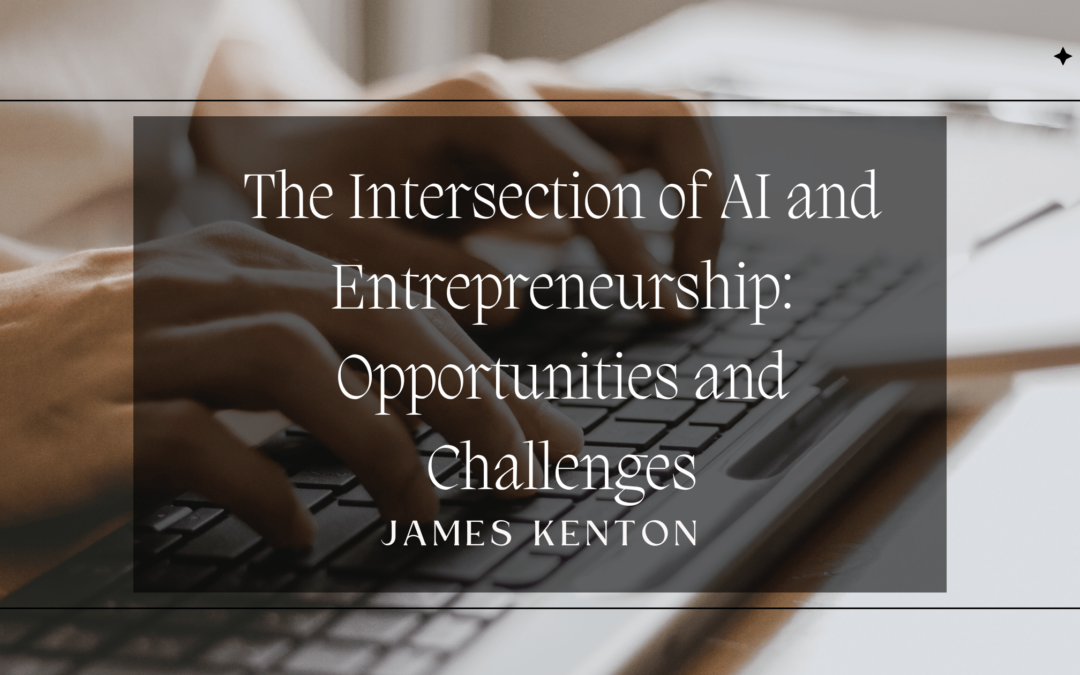In the ever-evolving landscape of entrepreneurship, one of the most transformative forces at play is Artificial Intelligence (AI). As AI technologies continue to advance, entrepreneurs find themselves at a critical intersection where innovation meets unprecedented challenges. This article explores the dynamic relationship between AI and entrepreneurship, shedding light on the vast opportunities it presents and the complex challenges it brings.
Opportunities in the AI-Empowered Entrepreneurial Landscape
- Automating Operations and Processes: One of the immediate benefits AI offers entrepreneurs is the ability to automate various business processes. From routine administrative tasks to complex decision-making processes, AI-driven automation streamlines operations, freeing up valuable time and resources for strategic
- Enhanced Data Analysis and Insights: AI enables entrepreneurs to derive actionable insights from massive datasets. Machine learning algorithms can analyze patterns, predict trends, and provide valuable information for informed decision-making. This empowers entrepreneurs to understand their market better, anticipate customer needs, and make data-driven choices.
- Personalized Customer Experiences: AI facilitates personalized customer experiences by analyzing customer behavior and preferences. Chatbots and virtual assistants powered by AI enhance customer interactions, providing tailored recommendations and solutions. This personalization not only improves customer satisfaction but also strengthens brand loyalty.
- Innovative Product and Service Development: Entrepreneurs can leverage AI to drive innovation in product and service development. Machine learning algorithms can identify gaps in the market, analyze customer feedback, and suggest improvements. This data-driven innovation allows entrepreneurs to stay ahead of the curve and meet evolving consumer demands.
- Cost Reduction and Efficiency: AI technologies contribute to cost reduction through improved efficiency. Automation, predictive maintenance, and smart resource allocation optimize operations, leading to lower operational costs. Entrepreneurs can allocate saved resources to further invest in growth and development.
Challenges at the AI-Entrepreneurship Nexus
- Initial Investment and Resource Allocation: While the benefits of AI are substantial, the initial investment required can be a significant barrier for entrepreneurs, particularly those with limited resources. Acquiring and implementing AI technologies may require a substantial upfront cost, making it crucial for entrepreneurs to carefully strategize resource allocation.
- Data Privacy and Security Concerns: The increasing reliance on AI for data analysis raises concerns about data privacy and security. Entrepreneurs must navigate the intricate landscape of data protection regulations and implement robust security measures to safeguard sensitive information. A breach not only poses a threat to customer trust but also has legal ramifications.
- Ethical Considerations and Bias: AI algorithms are only as unbiased as the data they are trained on. Entrepreneurs face the challenge of ensuring that AI applications are ethically developed and deployed. Addressing bias in algorithms and ensuring fairness in decision-making processes are critical considerations for responsible AI use.
- Workforce Displacement and Reskilling: The automation of routine tasks by AI can lead to workforce displacement in certain industries. Entrepreneurs need to be mindful of the societal impact and proactively engage in reskilling initiatives. Supporting employees in acquiring new skills can mitigate the negative effects of technological advancements on the job market.
- Regulatory Uncertainty: The rapid pace of AI development often outpaces regulatory frameworks. Entrepreneurs operate in an environment of regulatory uncertainty, where laws and standards may not have caught up with the latest technological advancements. Staying compliant while pushing the boundaries of innovation presents a delicate balance.
Strategies for Entrepreneurs Harnessing AI
- Strategic Collaboration and Partnerships: Entrepreneurs can overcome resource limitations by engaging in strategic collaborations and partnerships. Working with AI-focused startups, established tech companies, or research institutions allows entrepreneurs to access cutting-edge technologies without shouldering the entire burden of development costs.
- Prioritize Ethical AI Development: Addressing bias and ethical considerations should be at the forefront of AI integration. Entrepreneurs should actively seek diverse perspectives in AI development teams, employ robust testing for bias, and ensure transparency in how AI-driven decisions are made.
- Continuous Learning and Adaptation: The dynamic nature of AI requires entrepreneurs to foster a culture of continuous learning and adaptation. Staying informed about AI advancements, attending industry conferences, and investing in ongoing training for the workforce are essential components of navigating the AI landscape.
- Invest in Cybersecurity Measures: To address data privacy and security concerns, entrepreneurs must prioritize investments in cybersecurity measures. Implementing encryption, regular security audits, and compliance with industry standards contribute to building a secure foundation for AI applications.
- Engage in Advocacy for Clear Regulations: Entrepreneurs should actively engage in industry advocacy to contribute to the development of clear and comprehensive AI regulations. Collaborating with policymakers, industry associations, and experts helps create a regulatory environment that supports responsible AI innovation.
The intersection of AI and entrepreneurship holds immense promise, offering unprecedented opportunities for innovation, efficiency, and growth. However, the journey comes with its set of challenges, from the ethical considerations of AI development to the potential impact on the workforce. Entrepreneurs navigating this landscape must strike a balance between harnessing the power of AI and addressing the associated risks.
By strategically collaborating, prioritizing ethical AI development, fostering continuous learning, investing in cybersecurity, and engaging in advocacy for clear regulations, entrepreneurs can position themselves to thrive at the forefront of the AI revolution. The key lies not only in embracing technological advancements but also in ensuring that the integration of AI aligns with values of responsibility, inclusivity, and long-term sustainability. In this dynamic landscape, entrepreneurs who master the delicate dance between innovation and responsibility will be well-poised for success in the AI-powered future.

